| item(s), Total: $0.00 View Cart |
| Shopping cart is empty. |
Lack of rain means you need to keep an eye on your garden. While temperatures are cooler, plants won't stress as much from moisture loss - but you definitely need to keep an eye on them and - if they need it - give them a water. It's worth checking your soil first - if you've built it up with clay and biochar and used mulch, it may not be bone dry. We've had a number of frosts this winter - we've got an article on protecting your garden for you if they've come as a shock to you! Predictions are we'll get more - so we need to adapt our gardens. At the recent Nursery & Garden Industry Breakfast Sue McDougall gave a talk from her perspective as the new Director of Kings Park Botanic Gardens. She used the term "Climate Resilient Garden" and it has stuck with me. It's exactly what we need to aim for to strike the balance of living in a green city but not wasting resources. It really does come down to 'think globally; act locally' by influencing what you CAN control amidst what can be overwhelming at times. So let's get outside and garden! There's loads to do - in fact it's the perfect time to do many chores; as well as the fun stuff like planting! So we trust we've got inspiration and information in this newsletter to get you outside, and get active (and warm!) If you'd like even MORE inspiration, check out our Winter Garden Guide here. Remember our VIP delivery deal only lasts until Mid July - so get cracking to take advantage of 1/2 price bulk delivery!
From Linda and the Team @ The Green Life Soil Co In this newsletter:Jobs to do in the July garden (and school holidays) Jobs to do in the July garden (and school holidays)
What to plant nowSome things you can plant in your garden NOW are:-
It's a little late to grow some winter crops from seed - particularly slow growing brassica crops (*cabbage family). You can still grow carrots, beetroot, peas & many leafy greens from seed however. If you're wanting to try your luck with broccoli or cauli, look for healthy seedlings to plant out. You'll be saving yourself 4-6 weeks minimum, so you'll be picking your crops sooner. Another tip is to select dwarf or small growing varieties - they tend to mature quicker as they don't have to spend as long growing to their maximum size before flowering. Check out our FREE downloadable 'When to Plant in Perth' guide here. We've got one for vegies & another for herbs ~ as well as heaps more fact sheets, videos & info on individual vegies, natural pest control, building healthy soil and SO much more!!! If you're stuck inside due to inclement weather - spend some time and explore what we've got for you (click on the 'learning centre' tab). We're expecting Rhubarb & Asparagus crowns and Jerusalem Artichokes to arrive later this month. The crowns need to be lifted when dormant - and the growers decide the best time to do this; so timing is beyond our control. Please give us a call to pre-order (or keep an eye on our Facebook page) to confirm stock has arrived. (Click on the highlighted text for growing guides on these great perennial plants.) Wonderful Worms!
Regardless of the financial implications, this is a physical problem too - with so much diverted to landfill and the space and resources required to manage these sites. Thankfully, many councils and waste management bodies are looking into FOGO bins - which allow people to separate compostable items which go to large scale composting facilities. There is a need to educate the community about correct waste sorting to minimise contamination; an ongoing problem with FOGO waste. The good news is - using only a little space and our own resources, we can divert much of our food and garden waste and "close the loop" by recycling at home. Composting and Worm Farming is a worthwhile thing to do. And of these two processes, worm farming is the easiest to manage - so why not get a worm farm system set up? There are several different "off the shelf" worm farm systems you can buy. We stock the tiered "Worm Cafe" system, but there are many other options commercially available; some modified wheelie bins, and in-ground systems. Plus you can DIY! YouTube is full of videos about making and setting up a worm farm - from simple polystyrene vegetable boxes to elaborate designer & rodent proof systems; you're only limited by your imagination and building skills. Let's talk wormsWorldwide, there are over 3,000 types of worms - and about 350 of these live in Australia. There is a difference between native earthworms, who (if you're lucky) will live in your garden, and composting worms - which are bred and sold for composting/worm farming. Composting worms are voracious feeders, and are well suited to waste disposal systems. Native garden earthworms are not commercially available and are quite different in habit to composting worms. They play an important role in soil building and are an indicator of your soil's health. If you'd like to encourage them, here's how to do it: Leave raw organic matter (straw/seaweed/weeds/autumn leaves) on the soil surface to break down. Avoid digging. Always use mulch to keep soil cool and moist, and avoid high nitrogen fertilisers and pesticides. (Sounds exactly like good organic gardening practice to me!)
Worms will eat their own bodyweight every day or so; but they don't have teeth. They ingest sand/mineral particles which help grind food in their stomach. Worms will only be able to eat decomposing soft material - so if possible, cut up food/vegetable scraps to assist this process. Worms love protein - soaked cracked grains, pollard, etc. will help worms grow and reproduce faster. Don't add large volumes at once. Left over food will go rancid or moldy - if this happens, cut back on what you're feeding until numbers build up. Worms are most active when the temperature range is 20-25°c. Winter time they'll tick along; and you'll notice activity increase with the warmer weather. Once summer comes you'll need to be careful; in our summers worm farms can overheat - killing your worms in a day. Worm farms are fine in the winter sun - come summer they need to be undercover and checked more regularly. A tip is to keep an old milk or juice bottle, fill it with water and freeze overnight. Before leaving for work in the morning, place it inside the worm farm just on the surface. As it thaws, it will provide an area of cooler material that the worms can gravitate to if they are stressed. Keep two bottles going so you can swap them over each day in a heatwave.
What to feed wormsWorms will eat anything that was once living and will decompose (including cotton/wool fabric). However, they will do better if given a 'good' diet - and you'll get better quality castings as a result. It is recommended not to give worms excessive onions and citrus - but they can handle some as part of their feed. Avoid meat and dairy - not because the worms won't eat it; but you'll attract flies and rodents. Try feeding them:
Vegetable scraps can break down and increase acidity of the worm farm over time. It is recommended to give a light sprinkling of dolomite lime to the worm farm every now and again to correct the pH. If your worms are trying to escape, or the worm farm has a sour smell, this could be an indication it's too acidic. A healthy worm farm won't have an offensive odour. If it stinks - you're probably over feeding leading to rotting scraps and/or the worm farm is too damp. You could add zeolite and a bit of dolomite lime to assist with any smells (we stock these at GLSC), and increase ventilation. Worms don't like highly aromatic herbs or strongly scented plants; add these in small quantities. If introducing new foods, do so slowly to give them time to adjust. (They're fussy - who knew?) It's relatively easy to look after worms; feeding once or twice a week is ample - and if you go away for a few weeks, they're unlikely to starve if you feed them up before you go Layer materials that break down more slowly among the other food to sustain them - I find cardboard works well for this. It's a great job to give the kids to develop their interest in the natural world. And the bonus is that worm farms produce valuable castings to use in your garden. The tiered systems may only need a tray emptying once or twice a year (depending on your management) so it's not labour intensive. So why not set up a worm farm!? We've got more info on keeping worms, feeding worms, harvesting & using castings in our free fact sheets - check them out! Our team will be happy to give you more tips and advice if you come into store. Frost Season - what it means for your garden
Fortunately many plants are perfectly happy in frosty conditions. Northern hemisphere plants and many deciduous fruit trees benefit from the chill factor - winter dormancy is part of their heritage. (Conversely - if you live in areas that don't get cold enough, you need to look for "low chill" varieties of fruit trees otherwise you won't get worthwhile crops.) If frosts are a regular thing at your place, you've probably already adapted to them. If you're planning a new garden, there are things you can consider to protect sensitive plants. These include using hardy evergreen tree canopies as protection; incorporating rockeries and walls to store and reflect heat, positioning your garden on higher points rather than in depressions where colder air collects, incorporating water features - larger ponds and water bowls warm the air surrounding them, offering some protection. In colder climates, cloches (individual plant covers), greenhouses and cold frames for seedlings are commonplace. We can copy these ideas temporarily. Recycle plastic milk or juice containers - cut them down and invert over seedlings or precious cuttings. Physical barriers like vegie/insect netting, clear plastic and shade cloth will also offer protection and can be hastily erected on nights where frost is likely (even an old bed sheet!). Frost damage is caused when the sun quickly thaws the leaf surface, damaging cells. If you can gently hose the leaves before the sun reaches them, you can reduce the effects of frost.
If your garden has suffered damage from frost, here's how to save your plants.
If you get frosts where you live - take heart; it means you should be able to boast excellent brussels sprouts crops and excellent flavoured parsnips! VIP Special Offer(s)REMEMBER - our 1/2 price bulk delivery offer is still on until 15th July - so act NOW to get your soil & soil improvers (including manure and compost) in readiness for Spring.
For our VIP's, Cassies Clay is now: If shopping in store or over the phone, please mention the VIP special. If ordering online, you must log into the Member's Only section to find the discounted pricing available. Offer valid until Close of business Saturday, 30th July. Photo CompetitionThanks to everyone who sent in photos - great to see them still coming in! Remember, we choose someone at random each month to win a $50 store credit to spend with us - so give it a go! Next month, it might be YOU! This month's winner is Joan C. from Bassendean. Here's what she had to say about her garden: All ingrown beds were started with Sand Remedy and Charlie Charcoal as a base plus manures and compost. From the left photo: *Radichio palla rossa and Cicoria Pan Zucchero, Inground beds were started in 2019 from solarised grass and weeds with amendments from Green Life Soil Company. I also used your blood and bone, zeolite, potash and diatomaceous earth for slugs and in the chicken pen - keeps them free of fleas. Too many other photos to send. I enjoy receiving your monthly newsletter, always informative. Congratulations Joan, and thank you for sending in your entries! Keep them coming everyone - send them in via email with "photo competition" as the subject line, or send via Facebook. (I had to look up what Punterella is - a type of chicory grown for its inner stalk & edible leaves. Looks interesting!) Retailer UpdatePlease support your local independent retailer who supports us! The specialist retailers listed here will be happy to give you gardening advice and help you with our products - please call to check what lines they carry as they can't stock all of our products.
Ardess Nursery (Albany) 9842 9952 THANK YOU for being part of The Green Life Family! Keep up to date with news & info on our Facebook and Instagram pages.
|

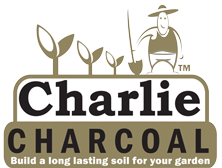

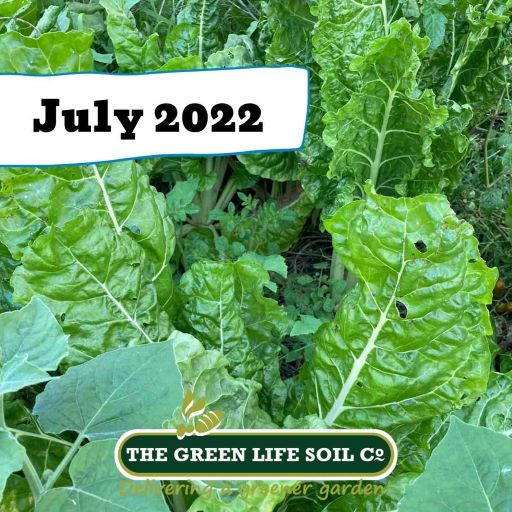 Welcome to July! We've passed the Winter Solstice so days will start to get a little longer; this is a signal to plants, and in another month or two we'll be seeing signs of Spring... But for now, we're still in the Noongyar season of Makuru. This is the time we should be seeing rains and winter creeks flowing - it's a little scary that June only received half of it's average rainfall this year, so let's hope we get some catch up rain soon (preferably at night and not on weekends!?).
Welcome to July! We've passed the Winter Solstice so days will start to get a little longer; this is a signal to plants, and in another month or two we'll be seeing signs of Spring... But for now, we're still in the Noongyar season of Makuru. This is the time we should be seeing rains and winter creeks flowing - it's a little scary that June only received half of it's average rainfall this year, so let's hope we get some catch up rain soon (preferably at night and not on weekends!?). We look forward to seeing you soon in store - come and visit us!
We look forward to seeing you soon in store - come and visit us!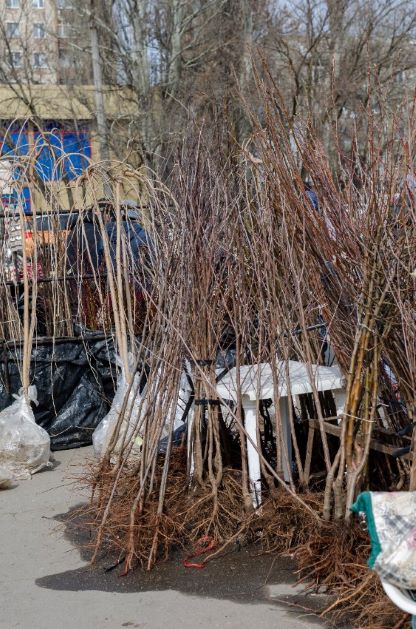 Get ready to spray for peach leaf curl if your nectarines and peaches suffered from this last year. It's a bit early yet - but get hold of your treatments and make it part of your garden routine to check on your susceptible fruit trees regularly. There is a window of opportunity to spray in late winter as the buds are just about to burst with new growth; you don't want to miss it. Wait for a couple of dry days before spraying.
Get ready to spray for peach leaf curl if your nectarines and peaches suffered from this last year. It's a bit early yet - but get hold of your treatments and make it part of your garden routine to check on your susceptible fruit trees regularly. There is a window of opportunity to spray in late winter as the buds are just about to burst with new growth; you don't want to miss it. Wait for a couple of dry days before spraying.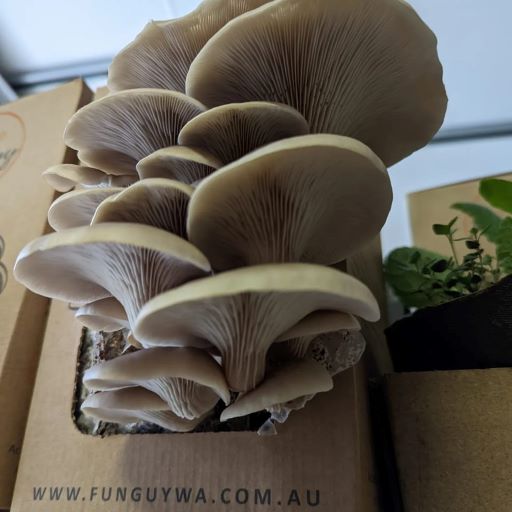 crops. If you've got spring flowering bulbs growing - give them a feed too (
crops. If you've got spring flowering bulbs growing - give them a feed too (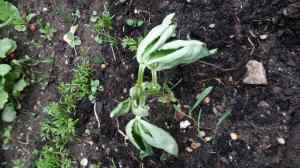 Something we've seen a bit in the last few years is people asking why the growing tips of their Board Bean plants are curling upwards and looking stunted & a little deformed. (Pictured right) It’s Bean Leafroll Virus - spread mainly by aphids, it causes twisted, curled growing tips and can effect bean production by about 50% or more. The good news is, it isn't spread from seed or soil - so if your bean plants are displaying symptoms, you have the choice of ripping them out or seeing how well they do (my recommendation). Destroy the plants after they've cropped, and if you save your seed, it will be interesting to see how next year's crop fares... Keep an eye out for any sign of pests/aphids and jump on it ASAP.
Something we've seen a bit in the last few years is people asking why the growing tips of their Board Bean plants are curling upwards and looking stunted & a little deformed. (Pictured right) It’s Bean Leafroll Virus - spread mainly by aphids, it causes twisted, curled growing tips and can effect bean production by about 50% or more. The good news is, it isn't spread from seed or soil - so if your bean plants are displaying symptoms, you have the choice of ripping them out or seeing how well they do (my recommendation). Destroy the plants after they've cropped, and if you save your seed, it will be interesting to see how next year's crop fares... Keep an eye out for any sign of pests/aphids and jump on it ASAP.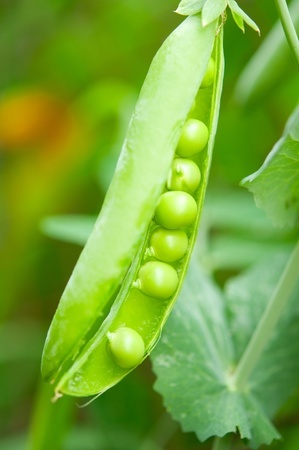 Artichokes (globe & Jerusalem types), Asparagus, Beetroot, Broad Beans, Broccoli, Cabbage, Celery, Celeriac, Coriander, Endive, English Spinach, Kale, Kohl Rabi, Lettuce, Mint, Onion, Parsley, Peas, Potatoes, Radish, Rhubarb, Silverbeet, Snow Pea, Spring Onion, Strawberries, Turnip.
Artichokes (globe & Jerusalem types), Asparagus, Beetroot, Broad Beans, Broccoli, Cabbage, Celery, Celeriac, Coriander, Endive, English Spinach, Kale, Kohl Rabi, Lettuce, Mint, Onion, Parsley, Peas, Potatoes, Radish, Rhubarb, Silverbeet, Snow Pea, Spring Onion, Strawberries, Turnip. Waste we humans produce is a problem. The statistics on global food waste is staggering - estimates say that 140kgs per person in Australia ends up in landfill every year. Statistics show that waste tends to be higher in households of young people (18-24), families with young children, and households with higher incomes. The biggest reason tends to be that we overshop and overcook - with leftovers often going to waste.
Waste we humans produce is a problem. The statistics on global food waste is staggering - estimates say that 140kgs per person in Australia ends up in landfill every year. Statistics show that waste tends to be higher in households of young people (18-24), families with young children, and households with higher incomes. The biggest reason tends to be that we overshop and overcook - with leftovers often going to waste.  If you're establishing a worm farming system (a "Wormery") you can buy worms (
If you're establishing a worm farming system (a "Wormery") you can buy worms (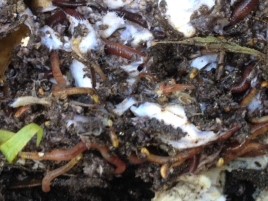 Worms require adequate moisture - ideally if you pick up a fistful of bedding material and squeeze it, you should be able to get a few drops of moisture out. Drainage in a worm farm is important - and commercially available worm farms have drainage in their design. Worm farms also need airflow - in summer, you may want to prop up the lid slightly to help. Worms also need protection from predators - birds, lizards, frogs, rats, etc. In an enclosed worm farm this shouldn't be too much of a problem - but it's something to keep in mind. (I have recycled fridge farms and in summer have found I need to keep lids propped open. This means I usually have a resident frog - which startles me on a regular basis - and I find rats from time to time. Rats are worse in worm farms because they'll actively dig for worms. Frogs are probably attracted for insects other than worms.)
Worms require adequate moisture - ideally if you pick up a fistful of bedding material and squeeze it, you should be able to get a few drops of moisture out. Drainage in a worm farm is important - and commercially available worm farms have drainage in their design. Worm farms also need airflow - in summer, you may want to prop up the lid slightly to help. Worms also need protection from predators - birds, lizards, frogs, rats, etc. In an enclosed worm farm this shouldn't be too much of a problem - but it's something to keep in mind. (I have recycled fridge farms and in summer have found I need to keep lids propped open. This means I usually have a resident frog - which startles me on a regular basis - and I find rats from time to time. Rats are worse in worm farms because they'll actively dig for worms. Frogs are probably attracted for insects other than worms.)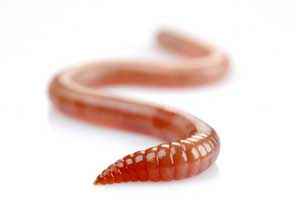 * worm farms can be set up to deal with dog poo - inground systems are probably better/easier for this. I've been told it's not their favourite diet (can't imagine why) so not to include other food waste because they'll eat that in preference... (let me know if you've had experience to the contrary!) You need to be careful with manures; if animals have been recently wormed, this will be detrimental to the worms in the worm farm too!
* worm farms can be set up to deal with dog poo - inground systems are probably better/easier for this. I've been told it's not their favourite diet (can't imagine why) so not to include other food waste because they'll eat that in preference... (let me know if you've had experience to the contrary!) You need to be careful with manures; if animals have been recently wormed, this will be detrimental to the worms in the worm farm too! While Perth is blessed with mild winters (on a global scale, anyway!) - some areas in the Hills and throughout regional Western Australia get VERY chilly in winter - and we wake up in the morning to find frost! It looks kind of magical - everything's white and crisply. It's caused when surface temperatures drop below freezing point and often occurs on clear nights (without cloud cover keeping air temperature a teensy bit warmer), and is usually worse in valleys and hollows where cooler air collects. Climate change is predicted to increase frosts in Southern Australia and the wheatbelt - so we do need to adapt our gardens if we live in susceptible areas.
While Perth is blessed with mild winters (on a global scale, anyway!) - some areas in the Hills and throughout regional Western Australia get VERY chilly in winter - and we wake up in the morning to find frost! It looks kind of magical - everything's white and crisply. It's caused when surface temperatures drop below freezing point and often occurs on clear nights (without cloud cover keeping air temperature a teensy bit warmer), and is usually worse in valleys and hollows where cooler air collects. Climate change is predicted to increase frosts in Southern Australia and the wheatbelt - so we do need to adapt our gardens if we live in susceptible areas.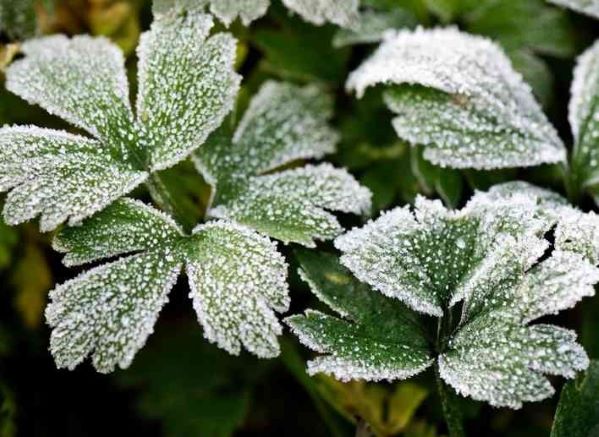 While mulch has many benefits to your soil, it can keep the heat IN, so it's recommended not to thickly mulch frost sensitive plants over winter. Clay soils also retain more heat than open sandy soils - another benefit to adding clay and improving soil structure.
While mulch has many benefits to your soil, it can keep the heat IN, so it's recommended not to thickly mulch frost sensitive plants over winter. Clay soils also retain more heat than open sandy soils - another benefit to adding clay and improving soil structure. 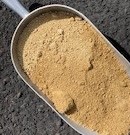 Our other special offer for you this month is Cassies Clay. This is a kaolin clay blend that we use in our mixes to assist with soil structure. Cassies Clay contains clay and silt - added to our sandy soil, it helps create more of a loam structure - holding onto water and nutrients and promoting habitat for beneficial microbes to thrive. We sell Cassies Clay in 15L bags and in bulk - which is the most economical way to improve larger areas of your garden. We'd recommend using it in sandy soil at approx. 5L per m2, dug into the top layer of soil to spade depth. (For very large areas, a rotary hoe is the best way to incorporate it quickly and easily. These can be hired.)
Our other special offer for you this month is Cassies Clay. This is a kaolin clay blend that we use in our mixes to assist with soil structure. Cassies Clay contains clay and silt - added to our sandy soil, it helps create more of a loam structure - holding onto water and nutrients and promoting habitat for beneficial microbes to thrive. We sell Cassies Clay in 15L bags and in bulk - which is the most economical way to improve larger areas of your garden. We'd recommend using it in sandy soil at approx. 5L per m2, dug into the top layer of soil to spade depth. (For very large areas, a rotary hoe is the best way to incorporate it quickly and easily. These can be hired.)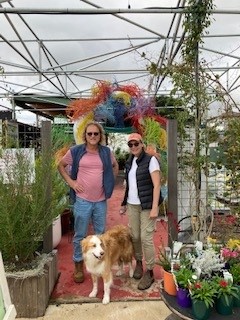 Evergreen Studio - North Beach 0419 091 095Garden Elegance - Subiaco 9381 2197Guildford Town Garden Centre - Guildford 9279 8645
Evergreen Studio - North Beach 0419 091 095Garden Elegance - Subiaco 9381 2197Guildford Town Garden Centre - Guildford 9279 8645





















